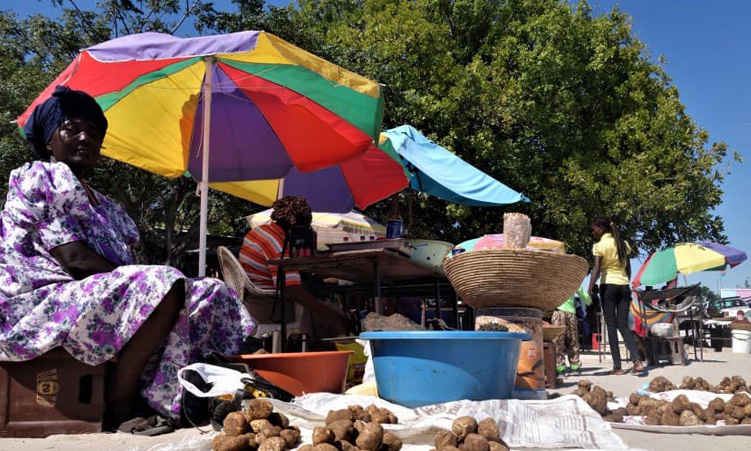TOTALITARIAN regimes maintain political control as a result of obvious information asymmetries between the governed and the governing class.It is why, at the heart of any decent discussion about good governance and democracy, lies an unequivocal commitment to transparency.
And good governance is the bedrock on which successful societies and democracies are constructed. When evoking successful models, President Hifikepunye Pohamba recently hosted the President of Singapore.It was good company because Singapore is one of the successful models that a young Namibia ought to emulate in terms of good governance.Emulating successful models is fitting in light of a recent interview Prime Minister Nahas Angula gave to the monthly publication Insight whose title read: “You can’t have a parastatal CEO earning more than the President.”Without exaggerating, this comment by the PM left me poker-faced.This is all the more preoccupying because the interview was supposedly meant to enlighten us on the salaries of elected officials as well as heads of state-owned enterprises.And this, after a journalist or journalists appallingly failed to obtain for a precedent edition what ought to be the most basic of information for a country whose President made the fight against corruption a key priority of his mandate.Offering a litany of arguments as to why government failed to curb salaries at SOEs, the Prime Minister was lucid, and even the most demanding reader would be impressed with the measures, albeit belatedly, that government is taking to rein in excesses at some of our parastatals.Alas, on the innocuous questions as to what the salary levels in government were, the Prime Minister as head of the public service and custodian of good governance in the public sector, if not offering a hodgepodge of explanations, abjured his authority by passing the buck (to reveal or not) to his subordinates, ministers, permanent secretaries etc.For example, on the mundane question as to how much the Prime Minister earns, the reader was left with the impression that the PM was playing hide and seek with the journalist.And on the more crucial question as to whether the Prime Minister could reveal the package of President Pohamba, he bluntly responded: “It is not for me to give it to you.This is a private contract between an employer and the individual person.The Prime Minister is an institution, not a person, and there is a level of understanding that if you give somebody’s package and the relative comes and ask “oh you earn so much”, then you cause confusion”.Sadly, the Prime Minister explicitly sacrifices transparency and public accountability in the face of predicaments in the form of family members who may come knocking at State House or the PM’s residence for a few Namibian dollars.But then, alarmingly, the Prime Minister goes on to claim in the same vein that the public does not exist.The defence of the PM against transparency or accountability on this question does not appear like a prudential error, it is one of principle.And here, it is evident that a lot of Thomas Hobbes’s ‘Leviathan’ or Jean-Jacques Rousseau ‘Social Contract’ is needed to deconstruct philosophically the Prime Minister’s perceptions as to what constitutes amongst others, the public.In democratic imaginary, to which a Prime Minister in a democracy ordinarily subscribes, the ‘public’ exist.The raison d’être of Government as an institution is only as an extension of the res publica.Additionally, as a public, which is the source of all legitimacy of the Government, we entered into a social contract with elected officials, more so the President through universal suffrage.By implication revealing such aspects of office, mundane, yet urgent in light of the Prime Minister’s dilly-dallying about revealing ought to be commonplace.In short, the Prime Minister’s argument is that the collective interest here would hurt the private (self) interest.The political philosopher Jean-Jacques Rousseau in ‘The Social Contract’ rightly warns that egoists might want to look at their interests above the collective interests.Thus, in the case of an elected official, like the President or the Prime Minister as an MP, the more urgent question is whether the public does not have the right to know how much they earn for us to make informed judgements about the state of our polity.Oddly, the glaring inconsistency here is that the Prime Minister reveals with regularity in newspapers how much secretaries, cleaners, clerks and prosecutors and directors earn in the public sector.It would then go without saying for the PM to reveal the President’s package when demanded by a journalist for a more enlightened public debate, just like the recent controversies around pay-hikes for Cabinet members in Singapore.As a public, ceteris (as is usual paribus) we might argue that the President or Prime Minister (MPs) are grossly underpaid for their daily toil.In his seminal book ‘L’Etat en Afrique: la politique du ventre’ the French scholar Jean-François Bayart writing on politics in Africa contends that “material prosperity is one of the chief political virtues rather than being an object of disapproval”.In essence, when the PM uses the Presidential perks as a benchmark, he attaches indecently financial satisfaction to the institution of the President.Yet, there is no bigger honour than being President of a country and it is why in countries like France, President Jacques Chirac earned less than his Prime Minister.That the President is first and foremost a servant of the people appears inconsequential to our PM.Let us admit that it is absurd for the salary of an MP or a Minister to be a secret! If leaders, including the President, have difficulty in revealing such insignificant aspects of office, it does raise interesting conundrums about their commitment to good governance and transparency.Thus, to conclude, it is not a bad habit of mind for a policy-maker to reveal how much he or she earns since it is an expression of the dignity and the moral character with which he or she hold public office.Similarly, to reveal is a sure sign of respect for the confidence that the public expresses in its elected leaders.* Alfredo Tjiurimo Hengari is a PhD fellow in Political Science at the University of Paris Panthéon Sorbonne, France.When evoking successful models, President Hifikepunye Pohamba recently hosted the President of Singapore.It was good company because Singapore is one of the successful models that a young Namibia ought to emulate in terms of good governance.Emulating successful models is fitting in light of a recent interview Prime Minister Nahas Angula gave to the monthly publication Insight whose title read: “You can’t have a parastatal CEO earning more than the President.”Without exaggerating, this comment by the PM left me poker-faced.This is all the more preoccupying because the interview was supposedly meant to enlighten us on the salaries of elected officials as well as heads of state-owned enterprises.And this, after a journalist or journalists appallingly failed to obtain for a precedent edition what ought to be the most basic of information for a country whose President made the fight against corruption a key priority of his mandate.Offering a litany of arguments as to why government failed to curb salaries at SOEs, the Prime Minister was lucid, and even the most demanding reader would be impressed with the measures, albeit belatedly, that government is taking to rein in excesses at some of our parastatals.Alas, on the innocuous questions as to what the salary levels in government were, the Prime Minister as head of the public service and custodian of good governance in the public sector, if not offering a hodgepodge of explanations, abjured his authority by passing the buck (to reveal or not) to his subordinates, ministers, permanent secretaries etc.For example, on the mundane question as to how much the Prime Minister earns, the reader was left with the impression that the PM was playing hide and seek with the journalist.And on the more crucial question as to whether the Prime Minister could reveal the package of President Pohamba, he bluntly responded: “It is not for me to give it to you.This is a private contract between an employer and the individual person.The Prime Minister is an institution, not a person, and there is a level of understanding that if you give somebody’s package and the relative comes and ask “oh you earn so much”, then you cause confusion”.Sadly, the Prime Minister explicitly sacrifices transparency and public accountability in the face of predicaments in the form of family members who may come knocking at State House or the PM’s residence for a few Namibian dollars.But then, alarmingly, the Prime Minister goes on to claim in the same vein that the public does not exist.The defence of the PM against transparency or accountability on this question does not appear like a prudential error, it is one of principle.And here, it is evident that a lot of Thomas Hobbes’s ‘Leviathan’ or Jean-Jacques Rousseau ‘Social Contract’ is needed to deconstruct philosophically the Prime Minister’s perceptions as to what constitutes amongst others, the public.In democratic imaginary, to which a Prime Minister in a democracy ordinarily subscribes, the ‘public’ exist.The raison d’être of Government as an institution is only as an extension of the res publica.Additionally, as a public, which is the source of all legitimacy of the Government, we entered into a social contract with elected officials, more so the President through universal suffrage.By implication revealing such aspects of office, mundane, yet urgent in light of the Prime Minister’s dilly-dallying about revealing ought to be commonplace.In short, the Prime Minister’s argument is that the collective interest here would hurt the private (self) interest.The political philosopher Jean-Jacques Rousseau in ‘The Social Contract’ rightly warns that egoists might want to look at their interests above the collective interests.Thus, in the case of an elected official, like the President or the Prime Minister as an MP, the more urgent question is whether the public does not have the right to know how much they earn for us to make informed judgements about the state of our polity.Oddly, the glaring inconsistency here is that the Prime Minister reveals with regularity in newspapers how much secretaries, cleaners, clerks and prosecutors and directors earn in the public sector.It would then go without saying for the PM to reveal the President’s package when demanded by a journalist for a more enlightened public debate, just like the recent controversies around pay-hikes for Cabinet members in Singapore.As a public, ceteris (as is usual paribus) we might argue that the President or Prime Minister (MPs) are grossly underpaid for their daily toil.In his seminal book ‘L’Etat en Afrique: la politique du ventre’ the French scholar Jean-François Bayart writing on politics in Africa contends that “material prosperity is one of the chief political virtues rather than being an object of disapproval”.In essence, when the PM uses the Presidential perks as a benchmark, he attaches indecently financial satisfaction to the institution of the President.Yet, there is no bigger honour than being President of a country and it is why in countries like France, President Jacques Chirac earned less than his Prime Minister.That the President is first and foremost a servant of the people appears inconsequential to our PM.Let us admit that it is absurd for the salary of an MP or a Minister to be a secret! If leaders, including the President, have difficulty in revealing such insignificant aspects of office, it does raise interesting conundrums about their commitment to good governance and transparency.Thus, to conclude, it is not a bad habit of mind for a policy-maker to reveal how much he or she earns since it is an expression of the dignity and the moral character with which he or she hold public office.Similarly, to reveal is a sure sign of respect for the confidence that the public expresses in its elected leaders.* Alfredo Tjiurimo Hengari is a PhD fellow in Political Science at the University of Paris Panthéon Sorbonne, France.
Stay informed with The Namibian – your source for credible journalism. Get in-depth reporting and opinions for
only N$85 a month. Invest in journalism, invest in democracy –
Subscribe Now!






